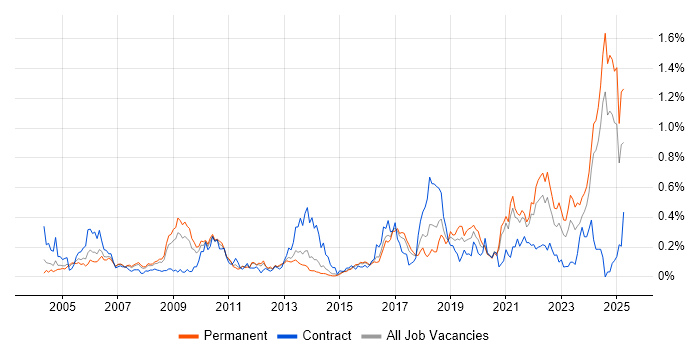Distributed Systems
England > Yorkshire
The table below looks at the prevalence of the term Distributed Systems in permanent job vacancies in Yorkshire. Included is a benchmarking guide to the salaries offered in vacancies that cited Distributed Systems over the 6 months leading up to 30 April 2025, comparing them to the same period in the previous two years.
| 6 months to 30 Apr 2025 |
Same period 2024 | Same period 2023 | |
|---|---|---|---|
| Rank | 113 | 193 | 289 |
| Rank change year-on-year | +80 | +96 | -41 |
| Permanent jobs citing Distributed Systems | 34 | 24 | 18 |
| As % of all permanent jobs advertised in Yorkshire | 1.27% | 0.42% | 0.22% |
| As % of the Miscellaneous category | 3.87% | 1.37% | 0.58% |
| Number of salaries quoted | 28 | 23 | 6 |
| 10th Percentile | £48,250 | - | £66,250 |
| 25th Percentile | £66,500 | £48,250 | £77,813 |
| Median annual salary (50th Percentile) | £77,500 | £68,000 | £85,000 |
| Median % change year-on-year | +13.97% | -20.00% | -15.96% |
| 75th Percentile | £98,474 | £69,500 | £104,375 |
| 90th Percentile | £140,677 | - | £110,000 |
| England median annual salary | £90,000 | £82,500 | £87,500 |
| % change year-on-year | +9.09% | -5.71% | +2.94% |
All Generic Skills
Yorkshire
Distributed Systems falls under the General and Transferable Skills category. For comparison with the information above, the following table provides summary statistics for all permanent job vacancies requiring generic IT skills in Yorkshire.
| Permanent vacancies with a requirement for generic IT skills | 879 | 1,753 | 3,106 |
| As % of all permanent jobs advertised in Yorkshire | 32.88% | 30.42% | 37.64% |
| Number of salaries quoted | 497 | 1,279 | 1,435 |
| 10th Percentile | £25,750 | £27,000 | £32,250 |
| 25th Percentile | £36,250 | £35,000 | £40,371 |
| Median annual salary (50th Percentile) | £50,000 | £50,000 | £55,000 |
| Median % change year-on-year | - | -9.09% | - |
| 75th Percentile | £73,886 | £67,500 | £75,000 |
| 90th Percentile | £96,250 | £82,500 | £87,500 |
| England median annual salary | £60,000 | £55,000 | £65,000 |
| % change year-on-year | +9.09% | -15.38% | +4.00% |
Distributed Systems
Job Vacancy Trend in Yorkshire
Job postings citing Distributed Systems as a proportion of all IT jobs advertised in Yorkshire.

Distributed Systems
Salary Trend in Yorkshire
3-month moving average salary quoted in jobs citing Distributed Systems in Yorkshire.
Distributed Systems
Salary Histogram in Yorkshire
Salary distribution for jobs citing Distributed Systems in Yorkshire over the 6 months to 30 April 2025.
Distributed Systems
Job Locations in Yorkshire
The table below looks at the demand and provides a guide to the median salaries quoted in IT jobs citing Distributed Systems within the Yorkshire region over the 6 months to 30 April 2025. The 'Rank Change' column provides an indication of the change in demand within each location based on the same 6 month period last year.
| Location | Rank Change on Same Period Last Year |
Matching Permanent IT Job Ads |
Median Salary Past 6 Months |
Median Salary % Change on Same Period Last Year |
Live Jobs |
|---|---|---|---|---|---|
| West Yorkshire | +61 | 29 | £85,253 | +25.37% | 8 |
| South Yorkshire | - | 4 | £77,500 | - | 3 |
| Distributed Systems England |
|||||
Distributed Systems
Co-occurring Skills and Capabilities in Yorkshire by Category
The follow tables expand on the table above by listing co-occurrences grouped by category. The same employment type, locality and period is covered with up to 20 co-occurrences shown in each of the following categories:
|
|
|||||||||||||||||||||||||||||||||||||||||||||||||||||||||||||||||||||||||||||||||||||||||||||||||||||||||||||||||||||||||||
|
|
|||||||||||||||||||||||||||||||||||||||||||||||||||||||||||||||||||||||||||||||||||||||||||||||||||||||||||||||||||||||||||
|
|
|||||||||||||||||||||||||||||||||||||||||||||||||||||||||||||||||||||||||||||||||||||||||||||||||||||||||||||||||||||||||||
|
|
|||||||||||||||||||||||||||||||||||||||||||||||||||||||||||||||||||||||||||||||||||||||||||||||||||||||||||||||||||||||||||
|
|
|||||||||||||||||||||||||||||||||||||||||||||||||||||||||||||||||||||||||||||||||||||||||||||||||||||||||||||||||||||||||||
|
|
|||||||||||||||||||||||||||||||||||||||||||||||||||||||||||||||||||||||||||||||||||||||||||||||||||||||||||||||||||||||||||
|
|
|||||||||||||||||||||||||||||||||||||||||||||||||||||||||||||||||||||||||||||||||||||||||||||||||||||||||||||||||||||||||||
|
|
|||||||||||||||||||||||||||||||||||||||||||||||||||||||||||||||||||||||||||||||||||||||||||||||||||||||||||||||||||||||||||
|
||||||||||||||||||||||||||||||||||||||||||||||||||||||||||||||||||||||||||||||||||||||||||||||||||||||||||||||||||||||||||||
